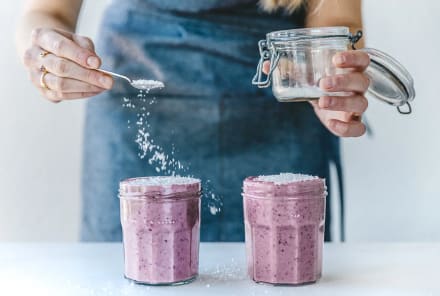Advertisement
3 Mistakes That Make Your Protein Shakes Unhealthy

High-protein foods curb your appetite and keep you full longer. One study found a protein-rich breakfast suppresses hunger far better than a carbohydrate-heavy breakfast. But you don’t always have time or an appetite for a substantial protein-rich breakfast: That’s why a protein shake is the perfect solution!
Studies show protein shakes can help you burn fat and keep it off better. One meta-analysis found one or two nutrient-fortified meal replacements could "safely and effectively produce significant sustainable weight loss and improve weight-related risk factors of disease." To get those and other benefits, you’ll want to design a protein shake correctly. I don’t want you making these three mistakes that crash-and-burn an otherwise-healthy protein shake:
1. Turning your protein shake into a milkshake.
Adding high-sugar ingredients like dried fruit, sweetened nut milks, and sugar-added almond butter can easily turn a potentially healthy shake into a sugar-loaded, fat-storing disaster.
Solution: Opt for low-sugar impact ingredients. My favorite blends the right protein powder with unsweetened coconut milk, frozen raspberries, avocado, kale and freshly ground flaxseeds. You have an easy, delicious, fat-blasting breakfast in minutes that keeps you full for hours.
2. Choosing the wrong protein.
Among a growing array of choices, finding the right protein shake can become a challenge. If you don't believe me, visit your local supermarket or health food store and read those labels.
Whey—the second most abundant protein in milk after casein—is seen as the gold standard for protein powders. The problem with whey is that it absorbs very quickly. That might be fine post-workout, but as a meal replacement whey becomes a disaster. Not to mention, one study found whey creates an insulin-raising effect similar to white bread. That explains why you’re hungry an hour after a whey shake, and not in the mood for wild salmon and Brussels sprouts, either.
Casein protein is another no-go. While it absorbs more slowly than whey, it comes with all of dairy’s potential reactivity. One study found casein peptides behave very similarly to gluten: They can react with opiate receptors in the brain, mimicking druglike effects.
Soy—usually found in protein powders as cheap soy isolate—also gets the thumbs down. Among its problems, Dr. Amy Shah says soy can adversely affect your thyroid. Plus, most soy is genetically modified (GMO).
Solution: One smart option is to find a grass-fed collagen protein, as it helps support healthy muscles, gut, hair, skin, joints, and more.* These supplements will provide you all of the overall benefits you're looking for, without many of the drawbacks that come from other protein powders.* Always look for one that comes from grass-fed cows as those will be the highest standard.
3. Buying powders with unhealthy ingredients.
Manufacturers make powders palatable with preservatives, maltodextrin, fructose and other sugars, excessive sugar alcohols, and artificial sweeteners. Those should all be red flags to put that powder back!
Solution: Read labels carefully, buy professional brands, and opt for protein powders that are low-sugar impact. Look out for the many different names for sugar, many of which are derived from GMO corn (e.g. "syrup", "juice", "concentrate", "fructose" and "sweetener"). Also only buy from brands that get their products vetted by third-party research.

JJ Virgin, CNS, BCHN, is a celebrity nutrition and fitness expert who helps clients lose weight fast by breaking free from food intolerance. A certified nutrition specialist, board certified Holistic Nutritionist, and Certified Exercise Physiologist, she is the author of the New York Times best-sellers The Virgin Diet: Drop 7 Foods, Lose 7 Pounds, Just 7 Days and The Virgin Diet Cookbook: 150 Easy and Delicious Recipes to Lose Weight and Feel Better Fast.
More from the author:
Functional Nutrition Training
Check out Functional Nutrition Coaching
A cutting-edge nutrition deep dive taught by 20+ top health & wellness experts
Learn moreMore from the author:
Functional Nutrition Training
Check out Functional Nutrition Coaching
A cutting-edge nutrition deep dive taught by 20+ top health & wellness experts
Learn more
JJ Virgin, CNS, BCHN, is a celebrity nutrition and fitness expert who helps clients lose weight fast by breaking free from food intolerance. A certified nutrition specialist, board certified Holistic Nutritionist, and Certified Exercise Physiologist, she is the author of the New York Times best-sellers The Virgin Diet: Drop 7 Foods, Lose 7 Pounds, Just 7 Days and The Virgin Diet Cookbook: 150 Easy and Delicious Recipes to Lose Weight and Feel Better Fast.
Watch Next
Enjoy some of our favorite clips from classes
Enjoy some of our favorite clips from classes
What Is Meditation?
Mindfulness/Spirituality | Light Watkins
Box Breathing
Mindfulness/Spirituality | Gwen Dittmar
What Breathwork Can Address
Mindfulness/Spirituality | Gwen Dittmar
The 8 Limbs of Yoga - What is Asana?
Yoga | Caley Alyssa
Two Standing Postures to Open Up Tight Hips
Yoga | Caley Alyssa
How Plants Can Optimize Athletic Performance
Nutrition | Rich Roll
What to Eat Before a Workout
Nutrition | Rich Roll
How Ayurveda Helps Us Navigate Modern Life
Nutrition | Sahara Rose
Messages About Love & Relationships
Love & Relationships | Esther Perel
Love Languages
Love & Relationships | Esther Perel
What Is Meditation?
Box Breathing
What Breathwork Can Address
The 8 Limbs of Yoga - What is Asana?
Two Standing Postures to Open Up Tight Hips
How Plants Can Optimize Athletic Performance
What to Eat Before a Workout
How Ayurveda Helps Us Navigate Modern Life
Messages About Love & Relationships
Love Languages
Advertisement

Green Tea vs Black Tea: Caffeine, Health Benefits & When To Sip Each
Jillian Kubala, M.S., R.D.










